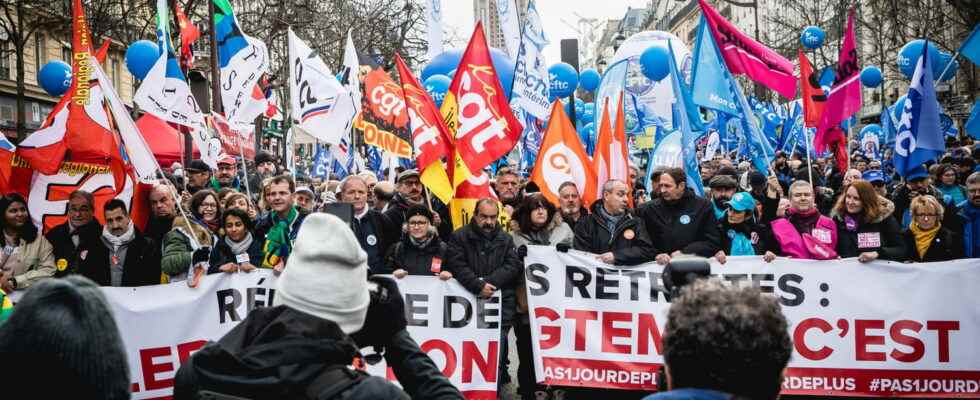FEBRUARY 7 STRIKE. Building on the success of the January 31 mobilization, the unions have called for general mobilization on February 7. Which sectors will be impacted?
The unions have made it known, the protest movement against the pension reform is here to stay. After a first major mobilization on January 19 (1.12 million demonstrators for the authorities), exceeded in magnitude by that of January 31 (1.272 million), the dates of February 7 and 11 have already been communicated by the inter-union.
These dates during the school holidays which begin on February 4 in zone A are not an obstacle for the organizers. “From the moment the government stubbornly insists on what causes conflict, there is the possibility of days of action during school holidays” had warned Philippe Martinez on RTL. On February 7, several sectors are likely to be disrupted, in particular transport (SNCF, RATP…) but also a three-day strike is planned in the refineries (from February 6 to 8). The Internet user takes stock of the situation.
Train traffic disrupted on February 7, 2023
The CGT des Cheminots warned in a communicated that they called “railroad workers of all colleges, all functions, all statuses, to continue the mobilization, by the strike, February 7 and 8, 2023“ next. This call for strike falls during the school holidays of zone A risked impacting certain journeys. However, according to information from BFM TV, the unions of the UNSA and the CFDT have launched a strike call only for the date of February 7, lasting 24 hours, excluding February 8 at the present time. More precise communications will be sent by the SNCF, at least 48 hours before the start of the strike. For the moment the announcements around February 11 are still expected. You can find all this information on L’internaute.
RATP strike on February 7
Like the SNCF, the RATP called for a strike on February 7 and 11. In a communicated the CGT, FO, CFE-CGC and Unsa have called for mobilization to say “no to the reform” because the special pension scheme for RATP agents is heavily threatened by it. The metro, RER, bus and tram lines therefore risk being impacted, as was the case on January 19 and 31. Like SNCF agents subject to a notice period, disruptions must also be announced at least 48 hours in advance.
A three-day strike for refiners
Announced nearly a month ago, a three-day mobilization is already planned by the CGT-Petrole from February 6 for 72 hours. The trade unionist Lionel Arbiol, CGT delegate of ESSO warned on BFM TV that: “We will continue to be in action as long as the government does not want to withdraw its reform project”. According to him, the hypothesis of a blockage of refineries for several days is “conceivable” as is the renewal of strikes. Refiners have already carried out several strikes since January which did not cause shortages because the refineries were not shut down.
However, Lionel Arbiol judges that it is “not impossible that we arrive at the situation of last September if the government insists on passing this reform”. The trade unionist refers to the refiners’ strike that took place last fall to demand a wage increase which had caused gasoline shortages. This new action by the unions, spread over three days from February 6 to February 8, could once again cause disruption for motorists. For the moment, these days of strikes are staggered over time and should not have the same impact as in 2022, occurring before the school holidays in zone A, many motorists could be tempted to “full precautions” accentuating the tension. at service stations.
Eric Sellini, coordinator for TotalEnergies explained to AFP the strategic choice around these dates; “this is where we will see if the switch is made or not, if the employees are ready to follow us on the slogan of renewal”, declared the trade unionist.
The energy sector also impacted
The FNME-CGT (National Federation of Mines and Energy-CGT) has also called for a three-day strike on February 6, 7 and 8 in companies in the electricity and gas industries. However, the strike movement had been less followed on January 31 at EDF with 40.3% of strikers against 44.5% on January 19. During these strikes, striking employees in the energy sector multiplied the “Robin Hood” operations. Some reductions in production have been announced, but mainly employees distributed free electricity to certain establishments such as hospitals, schools or HLM housing. An initiative supported by the unions but also by politicians like the communist Fabien Roussel.
A school strike on February 7
Although Zone A is on vacation on February 7, the union of primary schools, the Snuipp-FSU has called for an “amplification” of the protest movement. “The inter-union calls on the entire population to mobilize through strikes and even more massive demonstrations on Tuesday February 7 and then Saturday February 11 to say no to this reform” specifies the communicated of the union. The Snuipp-FSU recommends “multiplying actions, initiatives, meetings or general assemblies throughout the territory, in companies and services, in places of study, including through strikes”. Primary teachers (kindergarten, primary) have the obligation to notify students and families at least 48 hours in advance of their participation in the strike movement. Colleges and high schools do not have the obligation to declare themselves.
